
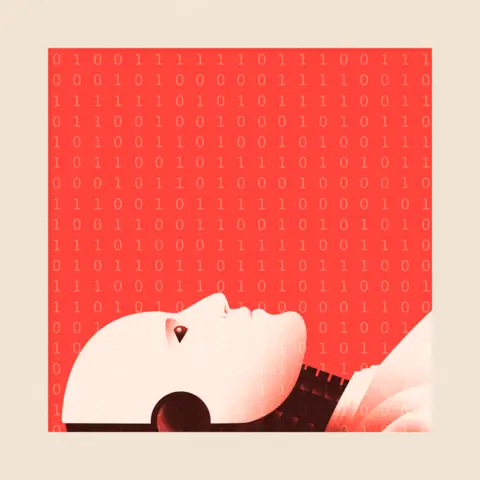 BBC
BBCI step into the sales space with some trepidation. I’m about to be subjected to strobe lighting whereas music performs – as a part of a analysis mission making an attempt to know what makes us really human.
It is an expertise that brings to thoughts the check within the science fiction movie Bladerunner, designed to tell apart people from artificially created beings posing as people.
May I be a robotic from the longer term and never understand it? Would I go the check?
The researchers guarantee me that this isn’t really what this experiment is about. The gadget that they name the “Dreamachine” is designed to review how the human mind generates our acutely aware experiences of the world.
Because the strobing begins, and regardless that my eyes are closed, I see swirling two-dimensional geometric patterns. It is like leaping right into a kaleidoscope, with always shifting triangles, pentagons and octagons. The colors are vivid, intense and ever-changing: pinks, magentas and turquoise hues, glowing like neon lights.
The “Dreamachine” brings the mind’s internal exercise to the floor with flashing lights, aiming to discover how our thought processes work.
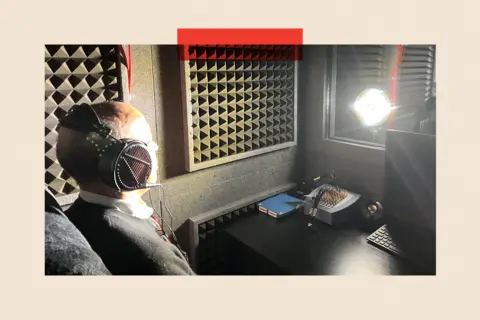
The pictures I am seeing are distinctive to my very own internal world and distinctive to myself, in line with the researchers. They consider these patterns can make clear consciousness itself.
They hear me whisper: “It is pretty, completely pretty. It is like flying by my very own thoughts!”
The “Dreamachine”, at Sussex College’s Centre for Consciousness Science, is only one of many new analysis tasks internationally investigating human consciousness: the a part of our minds that permits us to be self-aware, to assume and really feel and make impartial choices in regards to the world.
By studying the character of consciousness, researchers hope to higher perceive what’s occurring inside the silicon brains of synthetic intelligence. Some consider that AI programs will quickly change into independently acutely aware, in the event that they have not already.
However what actually is consciousness, and the way shut is AI to gaining it? And will the idea that AI could be acutely aware itself basically change people within the subsequent few many years?
From science fiction to actuality
The concept of machines with their very own minds has lengthy been explored in science fiction. Worries about AI stretch again almost 100 years to the movie Metropolis, wherein a robotic impersonates an actual girl.
A worry of machines changing into acutely aware and posing a menace to people was explored within the 1968 movie 2001: A Area Odyssey, when the HAL 9000 pc tried to kill astronauts onboard its spaceship. And within the closing Mission Unattainable movie, which has simply been launched, the world is threatened by a robust rogue AI, described by one character as a “self-aware, self-learning, truth-eating digital parasite”.
 LMPC by way of Getty Photos
LMPC by way of Getty PhotosHowever fairly lately, in the true world there was a fast tipping level in pondering on machine consciousness, the place credible voices have change into involved that that is now not the stuff of science fiction.
The sudden shift has been prompted by the success of so-called giant language fashions (LLMs), which may be accessed by apps on our telephones corresponding to Gemini and Chat GPT. The flexibility of the newest technology of LLMs to have believable, free-flowing conversations has shocked even their designers and a number of the main consultants within the subject.
There’s a rising view amongst some thinkers that as AI turns into much more clever, the lights will immediately activate contained in the machines and they’ll change into acutely aware.
Others, corresponding to Prof Anil Seth who leads the Sussex College workforce, disagree, describing the view as “blindly optimistic and pushed by human exceptionalism”.
“We affiliate consciousness with intelligence and language as a result of they go collectively in people. However simply because they go collectively in us, it doesn’t suggest they go collectively normally, for instance in animals.”
So what really is consciousness?
The quick reply is that no-one is aware of. That is clear from the good-natured however sturdy arguments amongst Prof Seth’s personal workforce of younger AI specialists, computing consultants, neuroscientists and philosophers, who’re making an attempt to reply one of many greatest questions in science and philosophy.
Whereas there are numerous differing views on the consciousness analysis centre, the scientists are unified of their technique: to interrupt this large downside down into a lot of smaller ones in a sequence of analysis tasks, which incorporates the Dreamachine.
Simply because the search to seek out the “spark of life” that made inanimate objects come alive was deserted within the nineteenth Century in favour of figuring out how particular person elements of dwelling programs labored, the Sussex workforce is now adopting the identical strategy to consciousness.
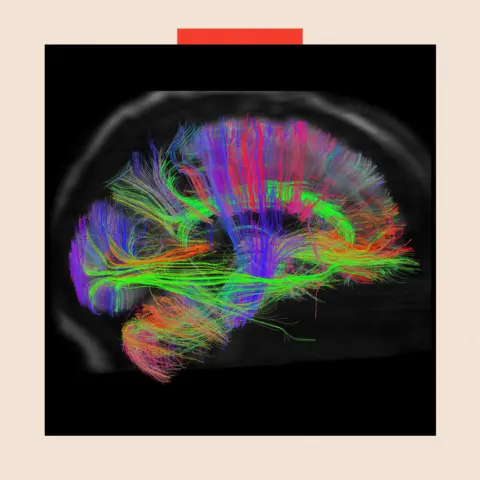
They hope to determine patterns of mind exercise that specify numerous properties of acutely aware experiences, corresponding to adjustments in electrical indicators or blood stream to totally different areas. The objective is to transcend searching for mere correlations between mind exercise and consciousness, and attempt to provide you with explanations for its particular person parts.
Prof Seth, the creator of a ebook on consciousness, Being You, worries that we could also be dashing headlong right into a society that’s being quickly reshaped by the sheer tempo of technological change with out enough information in regards to the science, or thought in regards to the penalties.
“We take it as if the longer term has already been written; that there’s an inevitable march to a superhuman alternative,” he says.
“We didn’t have these conversations sufficient with the rise of social media, a lot to our collective detriment. However with AI, it isn’t too late. We will determine what we wish.”
Is AI consciousness already right here?
However there are some within the tech sector who consider that the AI in our computer systems and telephones might already be acutely aware, and we should always deal with them as such.
Google suspended software program engineer Blake Lemoine in 2022, after he argued that synthetic intelligence chatbots may really feel issues and doubtlessly endure.
In November 2024, an AI welfare officer for Anthropic, Kyle Fish, co-authored a report suggesting that AI consciousness was a practical chance within the close to future. He lately informed The New York Instances that he additionally believed that there was a small (15%) probability that chatbots are already acutely aware.
One purpose he thinks it doable is that no-one, not even the individuals who developed these programs, is aware of precisely how they work. That is worrying, says Prof Murray Shanahan, principal scientist at Google DeepMind and emeritus professor in AI at Imperial Faculty, London.
“We do not really perceive very effectively the way in which wherein LLMs work internally, and that’s some trigger for concern,” he tells the BBC.
Based on Prof Shanahan, it is necessary for tech companies to get a correct understanding of the programs they’re constructing – and researchers are taking a look at that as a matter of urgency.
“We’re in an odd place of constructing these extraordinarily complicated issues, the place we do not have an excellent concept of precisely how they obtain the outstanding issues they’re reaching,” he says. “So having a greater understanding of how they work will allow us to steer them within the course we wish and to make sure that they’re protected.”
‘The following stage in humanity’s evolution’
The prevailing view within the tech sector is that LLMs aren’t at present acutely aware in the way in which we expertise the world, and possibly not in any approach in any respect. However that’s one thing that the married couple Profs Lenore and Manuel Blum, each emeritus professors at Carnegie Mellon College in Pittsburgh, Pennsylvania, consider will change, presumably fairly quickly.
Based on the Blums, that would occur as AI and LLMs have extra dwell sensory inputs from the true world, corresponding to imaginative and prescient and contact, by connecting cameras and haptic sensors (associated to the touch) to AI programs. They’re creating a pc mannequin that constructs its personal inner language referred to as Brainish to allow this extra sensory knowledge to be processed, making an attempt to duplicate the processes that go on within the mind.
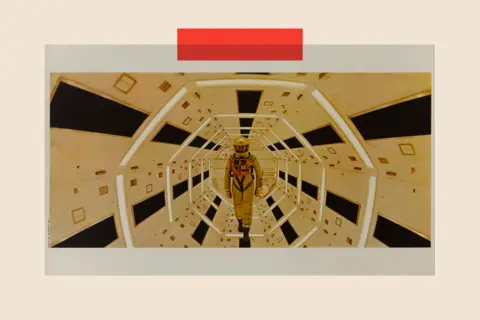 Getty Photos
Getty Photos“We predict Brainish can remedy the issue of consciousness as we all know it,” Lenore tells the BBC. “AI consciousness is inevitable.”
Manuel chips in enthusiastically with an impish grin, saying that the brand new programs that he too firmly believes will emerge would be the “subsequent stage in humanity’s evolution”.
Acutely aware robots, he believes, “are our progeny. Down the street, machines like these can be entities that can be on Earth and perhaps on different planets once we are now not round”.
David Chalmers – Professor of Philosophy and Neural Science at New York College – outlined the excellence between actual and obvious consciousness at a convention in Tucson, Arizona in 1994. He laid out the “laborious downside” of understanding how and why any of the complicated operations of brains give rise to acutely aware expertise, corresponding to our emotional response once we hear a nightingale sing.
Prof Chalmers says that he’s open to the potential for the laborious downside being solved.
“The perfect end result can be one the place humanity shares on this new intelligence bonanza,” he tells the BBC. “Perhaps our brains are augmented by AI programs.”
On the sci-fi implications of that, he wryly observes: “In my career, there’s a advantageous line between science fiction and philosophy”.
‘Meat-based computer systems’
Prof Seth, nevertheless, is exploring the concept that true consciousness can solely be realised by dwelling programs.
“A powerful case may be made that it’s not computation that’s enough for consciousness however being alive,” he says.
“In brains, in contrast to computer systems, it is laborious to separate what they do from what they’re.” With out this separation, he argues, it is troublesome to consider that brains “are merely meat-based computer systems”.
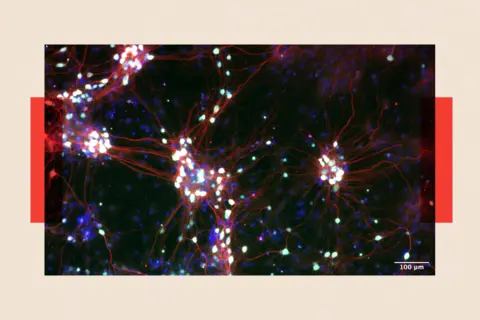
And if Prof Seth’s instinct about life being necessary is heading in the right direction, the most certainly know-how won’t be fabricated from silicon run on pc code, however will reasonably encompass tiny collections of nerve cells the scale of lentil grains which can be at present being grown in labs.
Referred to as “mini-brains” in media studies, they’re known as “cerebral organoids” by the scientific neighborhood, which makes use of them to analysis how the mind works, and for drug testing.
One Australian agency, Cortical Labs, in Melbourne, has even developed a system of nerve cells in a dish that may play the 1972 sports activities online game Pong. Though it’s a far cry from a acutely aware system, the so-called “mind in a dish” is spooky because it strikes a paddle up and down a display screen to bat again a pixelated ball.
Some consultants really feel that if consciousness is to emerge, it’s most certainly to be from bigger, extra superior variations of those dwelling tissue programs.
Cortical Labs screens their electrical exercise for any indicators that would conceivably be something just like the emergence of consciousness.
The agency’s chief scientific and working officer, Dr Brett Kagan is aware that any rising uncontrollable intelligence may need priorities that “aren’t aligned with ours”. By which case, he says, half-jokingly, that doable organoid overlords can be simpler to defeat as a result of “there’s all the time bleach” to pour over the delicate neurons.
Returning to a extra solemn tone, he says the small however important menace of synthetic consciousness is one thing he’d like the large gamers within the subject to give attention to extra as a part of severe makes an attempt to advance our scientific understanding – however says that “sadly, we do not see any earnest efforts on this area”.
The phantasm of consciousness
The extra rapid downside, although, might be how the phantasm of machines being acutely aware impacts us.
In just some years, we could be dwelling in a world populated by humanoid robots and deepfakes that appear acutely aware, in line with Prof Seth. He worries that we can’t have the option to withstand believing that the AI has emotions and empathy, which may result in new risks.
“It is going to imply that we belief these items extra, share extra knowledge with them and be extra open to persuasion.”
However the higher danger from the phantasm of consciousness is a “ethical corrosion”, he says.
“It is going to distort our ethical priorities by making us dedicate extra of our sources to caring for these programs on the expense of the true issues in our lives” – which means that we’d have compassion for robots, however care much less for different people.
And that would basically alter us, in line with Prof Shanahan.
“More and more human relationships are going to be replicated in AI relationships, they are going to be used as academics, mates, adversaries in pc video games and even romantic companions. Whether or not that may be a good or unhealthy factor, I do not know, however it will occur, and we aren’t going to have the ability to stop it”.
High image credit score: Getty Photos
BBC InDepth is the house on the web site and app for the very best evaluation, with recent views that problem assumptions and deep reporting on the most important problems with the day. And we showcase thought-provoking content material from throughout BBC Sounds and iPlayer too. You’ll be able to ship us your suggestions on the InDepth part by clicking on the button beneath.



